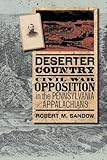Deserter Country : Civil War Opposition in the Pennsylvania Appalachians / Robert M. Sandow.
Material type: TextSeries: The North's Civil WarPublisher: New York, NY : Fordham University Press, [2011]Copyright date: ©2011Description: 1 online resource (246 p.) : 24 Black and White and color illustrationsContent type:
TextSeries: The North's Civil WarPublisher: New York, NY : Fordham University Press, [2011]Copyright date: ©2011Description: 1 online resource (246 p.) : 24 Black and White and color illustrationsContent type: - 9780823230518
- 9780823237562
- 973.7/12097487 22
- F153 .S24 2009eb
- online - DeGruyter
| Item type | Current library | Call number | URL | Status | Notes | Barcode | |
|---|---|---|---|---|---|---|---|
 eBook
eBook
|
Biblioteca "Angelicum" Pont. Univ. S.Tommaso d'Aquino Nuvola online | online - DeGruyter (Browse shelf(Opens below)) | Online access | Not for loan (Accesso limitato) | Accesso per gli utenti autorizzati / Access for authorized users | (dgr)9780823237562 |
Browsing Biblioteca "Angelicum" Pont. Univ. S.Tommaso d'Aquino shelves, Shelving location: Nuvola online Close shelf browser (Hides shelf browser)

|

|

|

|

|

|

|
||
| online - DeGruyter Dangerous Citizens : The Greek Left and the Terror of the State / | online - DeGruyter Dante and the Origins of Italian Literary Culture / | online - DeGruyter Derrida From Now On / | online - DeGruyter Deserter Country : Civil War Opposition in the Pennsylvania Appalachians / | online - DeGruyter Dis-Enclosure : The Deconstruction of Christianity / | online - DeGruyter Forgetting Lot's Wife : On Destructive Spectatorship / | online - DeGruyter Gazing Through a Prism Darkly : Reflections on Merold Westphal's Hermeneutical Epistemology / |
Frontmatter -- Contents -- List of figures and tables -- Acknowledgments -- Introduction -- 1 The Lumber Region as Pennsylvania’s Appalachia -- 2 Patterns of Protest: The Raftsmen’s Rebellion of 1857 -- 3 The Limits of Patriotism: Early Mobilization in the Mountains -- 4 The Rhetoric of Loyalty: Partisan Perspectives on Treason -- 5 Everyday Resistance in Pennsylvania’s Deserter Country -- 6 ‘‘Collisions with the People’’: Federal Intervention in Deserter Country -- Epilogue: Contested Memories of the Civil War -- Appendix: Supplemental Figures -- Notes -- Bibliography -- Index
restricted access online access with authorization star
http://purl.org/coar/access_right/c_16ec
During the Civil War, there were throughout the Union explosions of resistance to the war -from the deadly Draft Riots in New York City to other, less well-known outbreaks. In Deserter Country, Robert Sandow explores one of these least known "inner civil wars", the widespread, sometimes violent opposition in the Appalachian lumber country of Pennsylvania.Sparsely settled, these mountains were home to divided communities that provided safe-haven for opponents of the war. The dissent of mountain folk reflected their own marginality in the face of rapidly increasing exploitation of timber resources by big firms, as well as partisan debates over loyalty. One of the few studies of the northern Appalachians, this book draws revealing parallels to the War in the southern mountains, exploring the roots of rural protest in frontier development, the market economy, military policy, partisan debate, and everyday resistance. Sandow also sheds new light on the party politics of rural resistance, rejecting easy depictions of war-opponents as traitors and malcontents for a more nuanced and complicated study of the class, economic upheaval, and localism.
Mode of access: Internet via World Wide Web.
In English.
Description based on online resource; title from PDF title page (publisher's Web site, viewed 03. Jan 2023)


